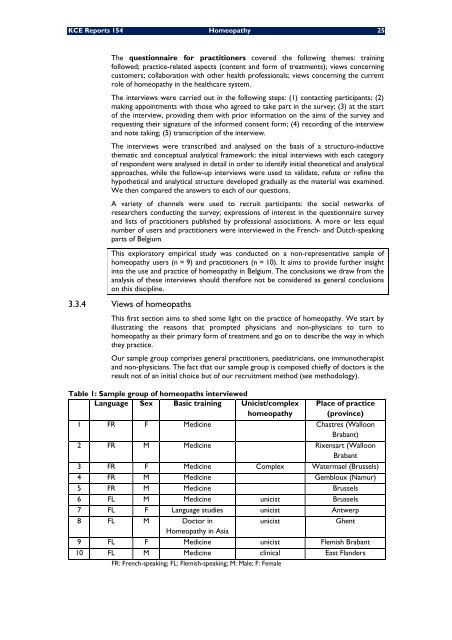Etat des lieux de l'homéopathie en Belgique - KCE
Etat des lieux de l'homéopathie en Belgique - KCE
Etat des lieux de l'homéopathie en Belgique - KCE
You also want an ePaper? Increase the reach of your titles
YUMPU automatically turns print PDFs into web optimized ePapers that Google loves.
<strong>KCE</strong> Reports 154 Homeopathy 25<br />
The questionnaire for practitioners covered the following themes: training<br />
followed; practice-related aspects (cont<strong>en</strong>t and form of treatm<strong>en</strong>ts); views concerning<br />
customers; collaboration with other health professionals; views concerning the curr<strong>en</strong>t<br />
role of homeopathy in the healthcare system.<br />
The interviews were carried out in the following steps: (1) contacting participants; (2)<br />
making appointm<strong>en</strong>ts with those who agreed to take part in the survey; (3) at the start<br />
of the interview, providing them with prior information on the aims of the survey and<br />
requesting their signature of the informed cons<strong>en</strong>t form; (4) recording of the interview<br />
and note taking; (5) transcription of the interview.<br />
The interviews were transcribed and analysed on the basis of a structuro-inductive<br />
thematic and conceptual analytical framework: the initial interviews with each category<br />
of respon<strong>de</strong>nt were analysed in <strong>de</strong>tail in or<strong>de</strong>r to i<strong>de</strong>ntify initial theoretical and analytical<br />
approaches, while the follow-up interviews were used to validate, refute or refine the<br />
hypothetical and analytical structure <strong>de</strong>veloped gradually as the material was examined.<br />
We th<strong>en</strong> compared the answers to each of our questions.<br />
A variety of channels were used to recruit participants: the social networks of<br />
researchers conducting the survey; expressions of interest in the questionnaire survey<br />
and lists of practitioners published by professional associations. A more or less equal<br />
number of users and practitioners were interviewed in the Fr<strong>en</strong>ch- and Dutch-speaking<br />
parts of Belgium.<br />
This exploratory empirical study was conducted on a non-repres<strong>en</strong>tative sample of<br />
homeopathy users (n = 9) and practitioners (n = 10). It aims to provi<strong>de</strong> further insight<br />
into the use and practice of homeopathy in Belgium. The conclusions we draw from the<br />
analysis of these interviews should therefore not be consi<strong>de</strong>red as g<strong>en</strong>eral conclusions<br />
on this discipline.<br />
3.3.4 Views of homeopaths<br />
This first section aims to shed some light on the practice of homeopathy. We start by<br />
illustrating the reasons that prompted physicians and non-physicians to turn to<br />
homeopathy as their primary form of treatm<strong>en</strong>t and go on to <strong><strong>de</strong>s</strong>cribe the way in which<br />
they practice.<br />
Our sample group comprises g<strong>en</strong>eral practitioners, paediatricians, one immunotherapist<br />
and non-physicians. The fact that our sample group is composed chiefly of doctors is the<br />
result not of an initial choice but of our recruitm<strong>en</strong>t method (see methodology).<br />
Table 1: Sample group of homeopaths interviewed<br />
Language Sex Basic training Unicist/complex<br />
homeopathy<br />
Place of practice<br />
(province)<br />
1 FR F Medicine Chastres (Walloon<br />
Brabant)<br />
2 FR M Medicine Rix<strong>en</strong>sart (Walloon<br />
Brabant<br />
3 FR F Medicine Complex Watermael (Brussels)<br />
4 FR M Medicine Gembloux (Namur)<br />
5 FR M Medicine Brussels<br />
6 FL M Medicine unicist Brussels<br />
7 FL F Language studies unicist Antwerp<br />
8 FL M Doctor in<br />
Homeopathy in Asia<br />
unicist Gh<strong>en</strong>t<br />
9 FL F Medicine unicist Flemish Brabant<br />
10 FL M Medicine clinical East Flan<strong>de</strong>rs<br />
FR: Fr<strong>en</strong>ch-speaking; FL: Flemish-speaking; M: Male; F: Female

















